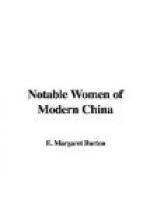Appreciation of Dr. Hue’s work is not limited to any one class of people. One day when she was watching the laying of the foundation of her home on Black Rock Hill, many of the people who lived near were gathered around, and she thought it would be a good opportunity to see how they felt about her coming there. So she asked an old “literary man” standing near her, “Ibah, are you glad to see us building? We will soon be your neighbours.” Without any hesitation he replied, while the others signified hearty approval of his remarks: “We are all delighted. It is a hospital, and very different from building a church. I-seng (doctor), you have made many cures in our families. Of course you don’t remember us, but even after the transmigration to either dog or hog we will remember you. You may be sure you are welcomed, only we are not good enough to be your neighbours.” After the doctor had left, her chair-bearers told her that the people really meant what they said; for they had heard them say similar things when she was not there. Dr. Hue added, “I do feel very sorry that these people are still ignorant that a mission hospital is a part of the church, but they will know some day.”
Nor has appreciation of the work been limited to words. From the magistrates down, the Chinese have readily subscribed gifts of money to the hospital work. Even the Chinese physicians, who have found Dr. Hue’s scientific training so formidable a rival to their practice, have exhibited a most friendly spirit. Dr. Hue says of them: “The Chinese doctors have bravely brought their patients for us to heal. Some of them are well-known doctors in the city here, so their coming to us helps our work a good deal. These doctors are not at all conceited. They talk very openly and frankly before everybody.”
That Dr. Hue is genuinely loved by her patients, and not valued simply as one from whom benefits are received, was evidenced during her mother’s long last illness. During the many months when her mother was so ill, the doctor made the long trip of several miles, from her hospital to her home, almost every night, returning each day for her morning clinics. This, and her care of her mother, added to all her other work, made such heavy days that the patients often said: “Dr. Hue must be very tired. We must save her from working too hard.”
This, however, is more easily said than done; for Dr. Hue’s sympathetic heart makes it very hard for her to spare herself as long as any one needs her help. For nine years after taking charge of the Woolston Memorial Hospital she worked almost unceasingly, with practically no vacations except those caused by the necessity of closing the hospital in the summer, and these she made as brief as possible. But during all this time the work had been steadily increasing, until finally, in 1907, when the number who thronged the hospital and dispensary was greater than ever before, the doctor’s health broke down under the strain,




